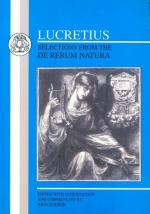|
This section contains 8,631 words (approx. 29 pages at 300 words per page) |

|
SOURCE: Nichols, Jr., James H. “Conclusion: Lucretius and Modernity.” In Epicurean Political Philosophy: The “De rerum natura” of Lucretius, pp. 179-210. Ithaca, N. Y.: Cornell University Press, 1976.
In the following excerpt, Nichols examines elements of Lucretius's thought present in the works of Thomas Hobbes, Charles-Louis Montesquieu, and Jean-Jacques Rousseau.
Of the Stoics, those famous rivals of the Epicureans, Nietzsche has written:
“According to nature” you want to live? O you noble Stoics, what deceptive words these are! Imagine a being like nature, wasteful beyond measure, indifferent beyond measure, without purposes and consideration, without mercy and justice, fertile and desolate and uncertain at the same time; imagine indifference itself as a power—how could you live according to this indifference? Living—is that not precisely wanting to be other than this nature?1
Nietzsche goes on to assert that the Stoics by no means live according to nature; rather, they...
|
This section contains 8,631 words (approx. 29 pages at 300 words per page) |

|


